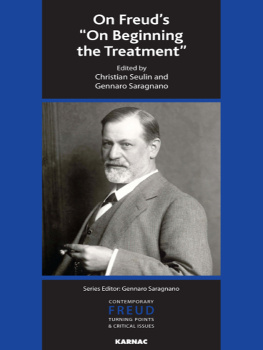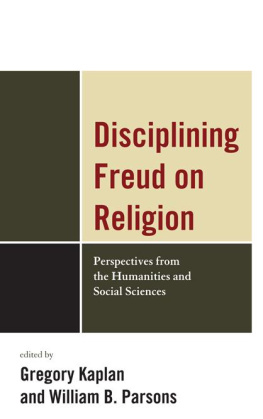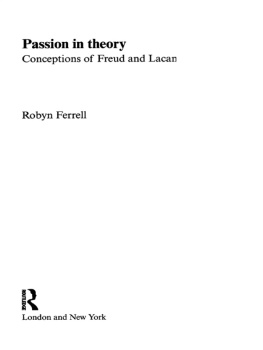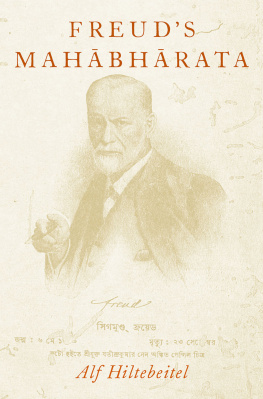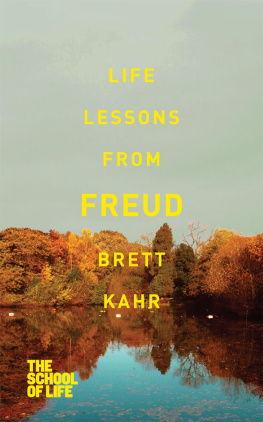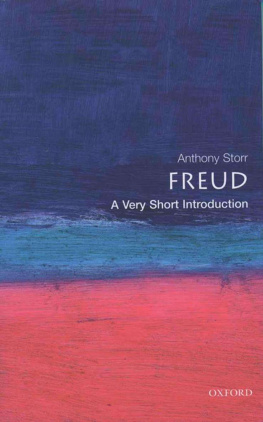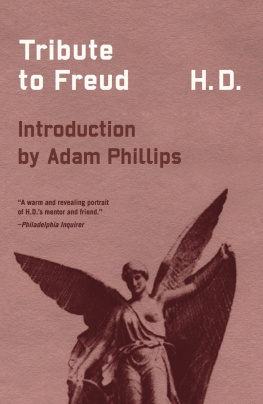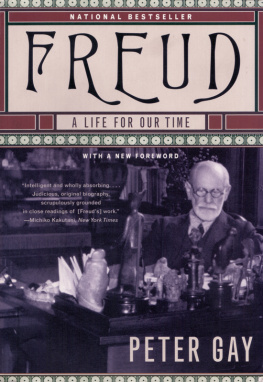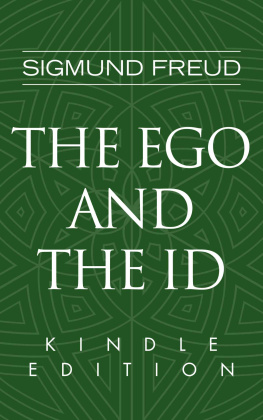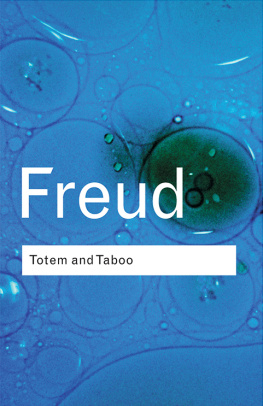Freud Sigmund - On Freuds On Beginning the Treatment
Here you can read online Freud Sigmund - On Freuds On Beginning the Treatment full text of the book (entire story) in english for free. Download pdf and epub, get meaning, cover and reviews about this ebook. City: London, year: 2012, publisher: Karnac Books, genre: Romance novel. Description of the work, (preface) as well as reviews are available. Best literature library LitArk.com created for fans of good reading and offers a wide selection of genres:
Romance novel
Science fiction
Adventure
Detective
Science
History
Home and family
Prose
Art
Politics
Computer
Non-fiction
Religion
Business
Children
Humor
Choose a favorite category and find really read worthwhile books. Enjoy immersion in the world of imagination, feel the emotions of the characters or learn something new for yourself, make an fascinating discovery.
- Book:On Freuds On Beginning the Treatment
- Author:
- Publisher:Karnac Books
- Genre:
- Year:2012
- City:London
- Rating:5 / 5
- Favourites:Add to favourites
- Your mark:
- 100
- 1
- 2
- 3
- 4
- 5
On Freuds On Beginning the Treatment: summary, description and annotation
We offer to read an annotation, description, summary or preface (depends on what the author of the book "On Freuds On Beginning the Treatment" wrote himself). If you haven't found the necessary information about the book — write in the comments, we will try to find it.
On Freuds On Beginning the Treatment — read online for free the complete book (whole text) full work
Below is the text of the book, divided by pages. System saving the place of the last page read, allows you to conveniently read the book "On Freuds On Beginning the Treatment" online for free, without having to search again every time where you left off. Put a bookmark, and you can go to the page where you finished reading at any time.
Font size:
Interval:
Bookmark:
First published in 2012 by
Karnac Books Ltd
118 Finchley Road
London NW3 5HT
Copyright 2012 to Christian Seulin and Gennaro Saragnano for the edited collection, and to the individual authors for their contributions.
The rights of the contributors to be identified as the authors of this work have been asserted in accordance with 77 and 78 of the Copyright Design and Patents Act 1988.
All rights reserved. No part of this publication may be reproduced, stored in a retrieval system, or transmitted, in any form or by any means, electronic, mechanical, photocopying, recording, or otherwise, without the prior written permission of the publisher.
British Library Cataloguing in Publication Data
A C.I.P. for this book is available from the British Library
ISBN 9781780490267
Edited, designed and produced by The Studio Publishing Services Ltd
www.publishingservicesuk.co.uk
e-mail:
Printed in Great Britain
www.karnacbooks.com
IPA Publications Committee
This significant series was founded by Robert Wallerstein and subsequently edited by Joseph Sandler, Ethel Spector Person, Peter Fonagy, and lately by Leticia Glocer Fiorini. Its important contributions have always greatly interested psychoanalysts of different latitudes. It is therefore my great honour, as the new Chair of the Publications Committee of the International Psychoanalytical Association, to continue the tradition of this most successful series.
The objective of this series is to approach Freuds work from a present and contemporary point of view. On the one hand, this means highlighting the fundamental contributions of his work that constitute the axes of psychoanalytic theory and practice. On the other, it implies the possibility of getting to know and spreading the ideas of present psychoanalysts about Freuds oeuvre, both where they coincide and where they differ.
This series considers at least two lines of development: a contemporary reading of Freud that reclaims his contributions, and a clarification of the logical and epistemic perspectives from which he is read today.
Freuds theory has branched out, and this has led to a theoretical, technical, and clinical pluralism that has to be worked through. It has therefore become necessary to avoid a snug and uncritical coexistence of concepts in order to consider systems of increasing complexities that take into account both the convergences and the divergences of the categories at play.
Consequently, this project has involved an additional taskthat is, gathering psychoanalysts from different geographical regions representing, in addition, different theoretical stances, in order to be able to show their polyphony. This also means an extra effort for the reader that has to do with distinguishing and discriminating, establishing relations or contradictions that each reader will have to eventually work through.
Being able to listen to other theoretical viewpoints is also a way of exercising our listening capacities in the clinical field. This means that the listening should support a space of freedom that would allow us to hear what is new and original.
In this spirit we have brought together authors deeply rooted in the Freudian tradition and others who have developed theories that had not been explicitly taken into account in Freuds work.
On beginning the treatment (1913) is one of the most important of Freuds technical articles, a theme he examined between 1904 and 1918. This text, which sets out the basis of the treatment and the conditions of psychoanalysis, still provides a solid reference for the analytic practice. Far from a group of rigid rules, Freud spoke of the technique as an art, thinking always of the singularity of each case, even if the fundamental methods of free association and suspended attention specify the psychoanalytical method that differentiates it from the suggestion.
In this book, ten eminent psychoanalysts, coming from different schools of psychoanalytic thought and from different geographical areas, confront the contemporary technical proposals to the Freudian precepts. The book re-examines, in the light of the latest advances in the analytic practice, such important questions as: the conditions of starting an analysis today; transference and associativity; the play of the person of the analyst and intersubjectivity; the fundamental rule enunciation in contemporary practice; the conditions and functions of the interpretation; and the energetic drives in action during the treatment.
Special thanks are therefore due to the contributors to this volume which enriches the Contemporary Freud series.
Gennaro Saragnano
Series Editor
Chair, IPA Publications Committee
First of all we wish to thank very much all the distinguished colleagues who have enriched this volume with their most valuable and appreciated contributions. It has been a pleasure to share with them all the efforts for making this book possible. All the members of the Publications Committee of the International Psychoanalytical Association have always given us their support and guidance. We also want to express our gratitude to our assistant at Broomhills, Rhoda Bawdekar, for her irreplaceable work in the editing process, and to Oliver Rathbone of Karnac Books for his continuous helpfulness.
Christian Seulin & Gennaro Saragnano
Alice Becker Lewkowicz is psychiatrist for adults, children, and adolescents, and associate member of the Porto Alegre Psychoanalytic Society (SPPA) where she develops activities with the community, particularly with teachers of small children. She is a professor and supervisor for Psychoanalytic Psychotherapy of Children and Adolescents in the Psychiatry Department at the Medical School of the Federal University of Rio Grande do Sul. Along with Sergio Lewkowicz, she has received the Fabio Leite Lobo prize for the best paper of full members during the Brazilian Congress of Psychoanalysis in 2011.
Hugo Bleichmar, MD, is a member of the Argentine Psychoanalytic Society (IPA) and Director of the Postgraduate Program in Psychoanalytic Psychotherapy (Pontificia Comillas University, Madrid, Spain). He is also the editor of the Journal Aperturas Psicoanalticas. His main interest is to develop a multidimensional model for psychopathology to describe the psychological pathways through which different components combine in a dynamic interaction, serially and in parallel, to generate subtypes of depression, narcissistic disorders, pathological mourning, and affective dysregulation. The implication of this approach is that if there are subtypes of the above mentioned psychopathological conditions, each of them needs to be specifically targeted. Psychoanalytic interventions that are appropriate for a particular case can be iatrogenic for others.
Marie-France Dispaux is a training analyst member of the Belgian Society of Psychoanalysis, and she was President of the Society, President of the Training Committee, and Director of the Belgian Review. Currently, she is European Representative at the IPA Board. She wrote essentially on the processes of transformation in the difficult cases. She also developed a reflection on the psychoanalytical training, in particular on the supervision.
Antonino Ferro is a training and supervising analyst of the Italian Psychoanalytic Society, and IPA and APsaA member. He has published several books translated in many languages, the last are Mind Works and Avoiding Emotions, Living Emotions published by Routledge. In 2007 he was selected to be a recipient of the Mary S. Sigourney Award. He also was
Font size:
Interval:
Bookmark:
Similar books «On Freuds On Beginning the Treatment»
Look at similar books to On Freuds On Beginning the Treatment. We have selected literature similar in name and meaning in the hope of providing readers with more options to find new, interesting, not yet read works.
Discussion, reviews of the book On Freuds On Beginning the Treatment and just readers' own opinions. Leave your comments, write what you think about the work, its meaning or the main characters. Specify what exactly you liked and what you didn't like, and why you think so.

